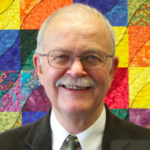
At my church, First UCC in Northfield, Minnesota, I watched the lighting of the first two Advent candles, symbolizing hope and peace, via our Zoom worship and will watch the lighting of the candles for the last two Sundays in Advent the same way. This is the reality of Advent in 2020, the Advent of the pandemic. It is so different than other years, very strange not to be there in the sanctuary, but still we light the candles, being physically separated won’t stop us.
We have the light of the candles and the reality of COVID-19. In 2020 this is the tension we all live in. We’re living out a verse from Psalm 30, “Weeping may linger for the night, but joy comes in the mornings.” COVID and candles.
The verse from the psalm tells us two things. First, the night is real. What caused someone long ago to write this psalm is lost in history, but today the psalm speaks to us about our lives during a time of surging numbers of COVID -19 cases, even as we wait for a vaccine. We need to be honest about how dangerous this time is, how we need to do all that we can not to catch the virus or to spread it to others.
Second, the psalm tells us that the night is not forever. The joy that comes in the morning is as real as the weeping and the night. The Candle of Hope has been lit. It’s dangerous to deny the reality of the pandemic. It’s also dangerous to deny the reality of hope for the joy that comes in the morning. Hope sustains us in these difficult times as it has sustained people of faith for millennia. We need it just as much as we need to stay safe.
I think that people living with mental illness are especially able to hear both parts of the message from Psalm 30. We know so much about weeping and night, the reality of lost dreams and hard disappointments. None of us chose to live with mental illness. We know that attempts to minimize how hard it’s been don’t help, but just get in the way of facing our illness. We must first come to terms with the darkness before we move into the light.
In recovery we learn that things can be better, that we can survive the night and find joy in the morning. We learn that this takes time, some days are lots better that others. We learn that, more than anything else, we need the help of others people to sustain us on our journey out of the darkness.
Again I think of lighting the Candle of Hope in church. Yes, this year we did it virtually, but we still did it together in worship, showing that hope is not sustained by just one of us but is something we share. For myself, as I think of all the people who have helped me in my own mental illness recovery, I know both that help is real and that I didn’t give it to myself.
Like our first Sunday in Advent service, Christmas Eve at my church will be on Zoom. It will be different, it will be strange, but we will be together, and together we will light the Christ Candle. We’ll worship in the truth of John’s gospel, “The light shines in the darkness, and the darkness did not overcome it.”

Bob Griggs
Ordained in 1973, Bob Griggs has served UCC churches in Massachusetts, New Hampshire, and Minnesota. He is an Advisory Council member at Vail Place, a club house for people living with mental illness. He is also the author of A Pelican of the Wilderness: Depression, Psalms, Ministry, and Movies and Recovering from Depression: Forty-Nine Helps.